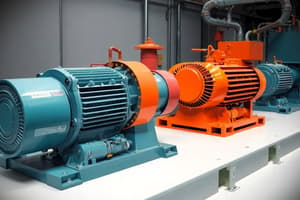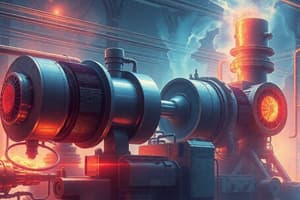Podcast
Questions and Answers
What is a DC machine?
What is a DC machine?
An electromechanical energy alteration device.
Who invented the first alternating current (AC) motor?
Who invented the first alternating current (AC) motor?
Nikola Tesla.
What are the two major classes of AC machines?
What are the two major classes of AC machines?
- Synchronous machines
- Induction machines
- Both A and B (correct)
- None of the above
The ______ is made up of low reluctance magnetic material like iron and silicon steel.
The ______ is made up of low reluctance magnetic material like iron and silicon steel.
What is the role of the armature in a DC machine?
What is the role of the armature in a DC machine?
What is the physical gap between the armature and fields/interpoles in a DC machine called?
What is the physical gap between the armature and fields/interpoles in a DC machine called?
The output of a separately excited DC motor is independent of the armature and field coils.
The output of a separately excited DC motor is independent of the armature and field coils.
What type of DC motor has its armature and field coils connected in series?
What type of DC motor has its armature and field coils connected in series?
What is the main function of carbon brushes in a DC machine?
What is the main function of carbon brushes in a DC machine?
Study Notes
Introduction of DC and AC machines
- DC and AC machines convert electrical energy into mechanical energy or vice versa, which are essential components in many applications.
Different Types and Examples of DC and AC machines
- DC Machine: an electromechanical energy alteration device.
- Separately Excited DC Motor: The armature and field coils are independent, powered separately.
- Output is the total sum of the two coils.
- Separately Excited DC Generator: The field winding is supplied by an independent external source (battery).
- Generated voltage depends on armature rotation speed and field current. Higher speed and current equate to higher voltage.
- Self-Excited DC Motor: Armature and field coil are connected in series, parallel, or a combination of both.
- Series DC Motor: Field winding is in series with the armature winding.
- Shunt DC Motor: Field winding is in parallel with the armature winding.
- Separately Excited DC Motor: The armature and field coils are independent, powered separately.
Construction of DC Machine
- Yoke/Frame: External housing, made of low reluctance magnetic material (iron, silicon steel)
- Commutator: Allows current flow from the armature to brushes in a DC generator.
- Carbon Brushes: Transfer power from the armature to stationary wires.
- Armature: The core of the machine, carries current and generates EMF (electromotive force). It is the rotating part of the machine.
- Armature Winding: Conducts direct current, producing a rotating magnetic field.
- Air Gap: The space between the rotating armature and the stationary field magnets.
- Stator: The stationary part of the machine, typically containing the field magnets.
- Shaft: Connects the armature to the load, transmitting mechanical power.
- Cooling Fan: Cools the coils in the armature and magnets.
Principle of DC Machine
- Electromagnetic Induction: The fundamental principle behind DC machine operation.
- A magnetic field is created when current flows through a conductor.
- When a conductor moves through a magnetic field, an electromotive force (EMF) is induced.
- This EMF can cause current to flow in another circuit (generator).
- Or, it can provide the force to rotate a shaft (motor).
AC Machine
- AC Machine: Converts alternating current into mechanical power.
- Synchronous Machine: The rotor speed is synchronized to the frequency of the AC supply.
- Induction Machine: The rotor speed is less than the frequency of the AC supply.
Principle of AC Machine
- Faraday's Law of Electromagnetic Induction: A changing magnetic field induces an electromotive force (EMF) in a conductor.
- This EMF can cause current to flow in a circuit.
- The alternating current flowing in the stator winding of an AC machine creates a rotating magnetic field.
- This field rotates the rotor of the machine.
Applications of DC Machine
- Electric Vehicles: DC motors are used in electric vehicles.
- Industrial Machinery: DC motors are used in many industrial applications like conveyor systems, cranes, and pumps.
- Household Appliances: DC motors are found in appliances like washing machines, refrigerators, and vacuum cleaners.
- Power Generation: DC generators are used in power plants to generate electricity.
Applications of AC Machine
- Power Generation: AC Generators are used in power plants to generate electricity.
- Electric Motors: AC motors are used in various applications, including industrial machinery, household appliances, and transportation.
- Household Appliances: AC motors are used in appliances like fans, air conditioners, and washing machines.
- Transportation: AC motors are used in electric vehicles, trains, and airplanes.
Studying That Suits You
Use AI to generate personalized quizzes and flashcards to suit your learning preferences.
Related Documents
Description
Explore the fundamentals of DC and AC machines, essential devices that convert electrical energy into mechanical energy and vice versa. This quiz covers various types of DC machines, including separately excited and self-excited motors, highlighting their operational principles and applications. Test your understanding of these electromechanical devices and their significance in various industries.




